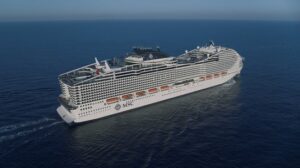 In a bold move that underscores its commitment to environmental stewardship, MSC Cruises has confirmed the order of two groundbreaking liquefied natural gas (LNG)-powered vessels from the prestigious French shipbuilder, Chantiers de l’Atlantique. This decision not only cements a two-decade-long partnership between the two titans of the maritime industry but also propels MSC Cruises to the forefront of sustainable maritime travel.
In a bold move that underscores its commitment to environmental stewardship, MSC Cruises has confirmed the order of two groundbreaking liquefied natural gas (LNG)-powered vessels from the prestigious French shipbuilder, Chantiers de l’Atlantique. This decision not only cements a two-decade-long partnership between the two titans of the maritime industry but also propels MSC Cruises to the forefront of sustainable maritime travel.
The two newly commissioned vessels, World Class 3 and 4, are set to be delivered in 2026 and 2027, joining their predecessors, MSC World Europa and MSC World America, in setting new benchmarks for energy efficiency in the industry. These ships are designed to outperform the International Maritime Organization (IMO) Energy Efficiency Design Index (EEDI) requirements, a testament to MSC’s unwavering commitment to environmental conservation.
Pierfrancesco Vago, Executive Chairman of MSC Cruises, expressed his pride in the enduring partnership with Chantiers de l’Atlantique, which has already resulted in 18 ships, with a 19th under construction. “The World Class is a truly innovative prototype, and together we are building some of the most advanced ships in the world,” said Vago. He further emphasized MSC’s dedication to exploring future environmental technologies, aligning with its goal of achieving net-zero greenhouse gas emissions by 2050.
On the other hand, Laurent Castaing, General Manager of Chantiers de l’Atlantique, acknowledged the significance of MSC Cruises’ confidence in their shipbuilding expertise, especially during challenging times for the European shipbuilding industry. He praised MSC Cruises for accepting a cost premium to improve the energy efficiency of these new vessels, which are expected to emit 50% less CO2 compared to the IMO’s 2008 benchmark.
The World Class vessels are not just marvels in fuel efficiency but also equipped to utilize alternative fuels such as bio and synthetic methane and green methanol. Moreover, these ships will feature next-generation dual-fuel internal combustion engines with reduced methane slip, signifying a leap forward in reducing maritime carbon footprints.
In addition to their advanced propulsion systems, these ships will boast shore power plug-in connectivity, reducing carbon emissions while in port. They will also incorporate the most advanced wastewater treatment systems, compliant with IMO standards, and new strides in waste management. The onboard energy-efficient equipment optimises engine use and meets hotel energy needs, minimizing emissions.
This visionary undertaking by MSC Cruises, subject to access to financing as per industry norms, marks a significant step in the evolution of sustainable maritime travel, proving that luxury and environmental responsibility can coexist in harmony on the high seas.
Written by: Michelle Warner






















